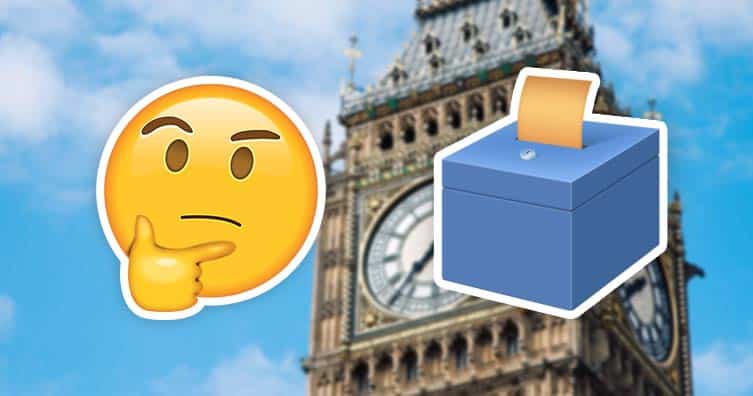Who should students vote for in the general election?
This is looking like it'll be the most important general election for a generation, so let us take you through the biggest talking points from each of the major parties' manifestos.

Unless you've been living under a rock for the last few weeks, you'll have seen that there's the small matter of a general election coming up.
We know it can be hard to make sense of all the political chat, and with all the exams and deadlines you've got at this time of year, we can see why it's tempting to give the election a miss.
But your vote really matters, and if you're going to cast one, it should be on an informed basis! Scroll through to read about each major party's policies on all the big topics, or use the quick links below to jump to the areas that matter most to you.
General election policies
2019 general election manifestos
We'll summarise all the key talking points from each of the major areas of policy in a second, but if you'd like to read the manifestos yourself, here are the direct links:
- Brexit Party (since deleted their manifesto)
- Conservatives
- DUP
- Green Party
- Labour
- Liberal Democrats
- Plaid Cymru
- Scottish National Party
- Sinn Féin
- UKIP
Why are only some policies featured below?

We wanted to make this guide as useful and as relevant as possible for students in the UK. So, as we didn't fancy typing out the entirety of each manifesto, we asked students in our Facebook group which issues they felt were most important.
Hundreds of you responded, and we've used that data to decide which areas to cover (and in what order).
We've only included policies that are explicitly mentioned in each party's manifestos, but we would encourage you to do some further reading as some parties are making extra pledges on top of these.
And, as the election rumbles on, we'd strongly recommend checking out some independent fact-checking sites, like Full Fact.
Don't get us wrong, we've tried our best to pick out the verifiable lies in the manifestos – both the Brexit Party and UKIP, for example, pledged to scrap the target of sending 50% of young people to university. This 'target' was a symbolic goal announced by Tony Blair in the late 1990s and was never official policy, so we've not included these pledges below.
But we can't spot everything, and as organisations like Full Fact do this kind of detective work for a living, you should give them a visit!
Universities and tuition fees policies

With students graduating with more debt than ever before, it's hardly a surprise that all the major parties address university fees and funding in some way in their manifestos.
To help you get an idea of who's promising what, we've summarised all the main pledges on tuition fees, Student Loans and universities below:
Brexit Party
- Abolish the interest on Student Loans.
Conservatives
- Look at the interest rates on Student Loan repayments with the aim of reducing student debt.
- Reinstate Maintenance Grants for student nurses.
- Tackle grade inflation and low-quality courses.
- Improve the system of applying to, and being offered a place at, university.
- Strengthen academic freedom and free speech in universities.
 DUP
DUP
- Nothing specific to higher education in the manifesto.
 Green Party
Green Party
- Abolish tuition fees.
- Cancel the existing debt of any graduates who have paid £9,000 a year or more for their tuition.
- Reinstate Maintenance Grants for student nurses.
 Labour
Labour
- Create a National Education Service to provide everyone with free education for life (including scrapping tuition fees).
- Bring back Maintenance Grants.
- Widen participation in higher education, including for part-time students.
 Liberal Democrats
Liberal Democrats
- Strengthen the Office for Students (the independent regulator for universities), with the aim of improving education for all students.
- Introduce a Student Mental Health Charter.
- Bring back Maintenance Grants.
- Establish a review of fees and funding in higher education.
- Widen participation in higher education.
Plaid Cymru
- Work towards making higher education free for all.
- Review the funding on offer for undergraduate and postgraduate students living and studying in Wales, including a subsidy for Welsh students who study in Wales.
- Offer free tuition to specific groups and those studying specific subjects.
- Protect participation in Erasmus+ (if and when we leave the EU).
 Scottish National Party
Scottish National Party
- Retain free tuition in Scotland for Scottish students.
 Sinn Féin
Sinn Féin
- Not explicitly addressed in manifesto.
 UKIP
UKIP
- Scrap tuition fees for further and higher education courses in science, technology, mathematics and medicine courses (as long as graduates of these courses work in the UK for five years).
NHS and social care policies

Credit: Jacob Lund – Shutterstock
The NHS is always one of the biggest battlegrounds in any general election, and this year is no different.
Read on to discover each major party's policies on the NHS, social care and mental health provisions:
Brexit Party
- No future privatisation of the NHS. Any existing private initiatives that have "failed" will be returned to public ownership.
- Support investment in medical research and development.
- Introduce 24-hour GP surgeries to relieve pressure on A&E departments.
Conservatives
- 50,000 more nurses, 6,000 more doctors in GPs and 6,000 more primary care professionals (e.g. physiotherapists and pharmacists). This is on top of the 7,500 extra nurse associates and 20,000 primary care professionals already announced.
- Reinstate Maintenance Grants for student nurses.
- Build 40 new hospitals over the next 10 years, in addition to 20 hospital upgrades already announced.
- An extra £1 billion every year towards social care.
 DUP
DUP
- Increase public sector pay, including in the NHS.
- Increase investment in mental health services, including a focus on the prevention of conditions developing.
 Green Party
Green Party
- Increase funding for the NHS by at least £6 billion each year until 2030.
- Roll back the privatisation of the NHS.
- Put mental healthcare on par with physical healthcare by increasing funding and ensuring that mental health therapies are accessible within 28 days for those who are in need.
- Reinstate Maintenance Grants for student nurses.
 Labour
Labour
- Increase expenditure across the health sector by an average of 4.3% each year.
- End and reverse the privatisation of the NHS.
- Provide free annual dental health check-ups.
- An extra £1.6 billion each year to ensure access to mental health services is on a par with physical health services.
- Establish a "comprehensive" National Care Service for England to cover social care, starting by providing free care to the elderly and eventually extending this provision to all working-age adults.
- Increase the Carer's Allowance for full-time unpaid carers.
 Liberal Democrats
Liberal Democrats
- An extra £7 billion each year for the NHS and social care.
- Introduce an independent budget monitoring body for health and care to report on how much money is needed to safely and sustainably deliver treatment and care.
- Additional investment in mental health services.
- Make prescriptions free for those with chronic mental health conditions.
Plaid Cymru
- Provide free social care at the point of need.
- Recruit an additional 1,000 doctors, 5,000 nurses and 100 dentists for the Welsh NHS.
- Oppose the privatisation of the NHS.
- A 5% increase in mental health expenditure every year for the next 10 years.
- Establish a 24/7 Mental Health Crisis service to operate alongside the emergency services.
 Scottish National Party
Scottish National Party
- Call on the UK government to match spending per person on the NHS in Scotland.
- Propose a National Health Service Protection Act to ensure that the NHS cannot be included in trade deals.
 Sinn Féin
Sinn Féin
- Work to deliver "safe staffing levels for health care workers".
 UKIP
UKIP
- Introduce an NHS Health Card to ensure that only British citizens can use the NHS, with foreign nationals needing private health insurance (unless an agreement has been reached with their country of origin).
- Waive tuition fees for students on courses leading to qualification as GPs, nurses and midwives, as long as said students work in the NHS for at least five years.
- Increase mental health funding by £500 million every year.
Environmental policies

If there's one thing that all of the main parties seem to agree on, it's that the planet is in some serious trouble and we need to get our act together.
From emissions to plastic waste and everything in between, here's what they all plan to do for the environment:
Brexit Party
- Plant millions of trees to capture CO².
- Promote a global initiative at the UN.
- Recycle waste produced in Britain and make it illegal for it to be exported.
Conservatives
- Reach net-zero carbon emissions by 2050.
- Introduce legal targets for air quality (to replace existing EU targets, should we leave the EU).
- No support for fracking until science "categorically" shows that it can be done safely.
- Increase the proportion of recyclable plastics in packaging.
- Increase penalties for fly-tipping.
- Introduce a deposit return scheme to encourage people to recycle plastic and glass.
 DUP
DUP
- Reach net-zero carbon emissions by 2050.
- Ban the sale of new petrol and diesel cars by 2035.
 Green Party
Green Party
- Reach net-zero climate emissions by 2030.
- Substantially increase our reliance on renewable energy sources, with wind in particular providing 70% of our electricity by 2030.
- Insulate every home that needs extra insulation by 2030.
- Ban fracking.
- Stop the construction of any new nuclear power stations.
- Ban the production of single-use plastics for use in packaging.
- Extend the tax on plastic bags to other single-use plastics and extend plastic bottle deposit schemes.
 Labour
Labour
- Reach net-zero emissions within the 2030s, with almost 90% of electricity and 50% of heat from renewable and low-carbon sources by 2030.
- End the sale of petrol and diesel cars by 2030.
- Ban fracking.
- Introduce a new Clean Air Act which complies with World Health Organisation limits.
- Support bottle-return schemes.
- Make companies fully responsible for the cost of recycling or disposing of the waste they produce, with the aim of encouraging more sustainable design and manufacturing.
 Liberal Democrats
Liberal Democrats
- Insulate every home in Britain by 2030.
- Ban fracking.
- Ensure at least 80% of the UK's electricity is from renewable sources by 2030.
- Plant 60 million trees every year.
- Ensure that, by 2030, all new cars are electric.
Plaid Cymru
- Ban the import of soy, beef and other agricultural products that used illegally deforested land.
- Ban fracking and the opening of new open-cast coal mines.
- Plant a minimum of 2,000 hectares of trees every year from 2020.
- Introduce a Clean Air Act for Wales.
- Phase out petrol and diesel cars by 2030.
- Ban single-use plastics.
 Scottish National Party
Scottish National Party
- Reach net-zero carbon emissions by 2040 and net-zero of all emissions by 2045.
- Campaign for the UK government to match the Scottish target of moving to electric vehicles by 2032.
- Campaign for the UK to remain aligned with EU environmental regulations, even if Brexit takes place.
 Sinn Féin
Sinn Féin
- "Action to tackle the climate emergency".
 UKIP
UKIP
- Bring in biodegradable carrier bags and packaging.
- Scrap subsidies for wind turbines and large solar farms, in favour of supporting renewable energy if and when it can deliver electricity at a lower cost.
- Protect the green belt (undeveloped land) from the threat of large-scale development that is a result of "unsustainable population growth" following "mass uncontrolled immigration".
- Boost the UK's coal industry.
- Scrap the Climate Change Act.
Brexit policies

Credit: lazyllama – Shutterstock
It's hard to believe that our membership in the European Union has now dominated not one, not two, but three general elections. Except it's not hard to believe, because it feels like the whole debate has been raging on for even longer than that.
Here's what each of the major parties plans to do with Brexit:
Brexit Party
- No extended transition period for leaving the EU.
- Leave the EU without a deal if a new one can't be struck by the next deadline (the Brexit Party has already condemned the latest deal as "not Brexit").
Conservatives
- Push Boris Johnson's latest deal through Parliament before Christmas and leave the EU in January.
 DUP
DUP
- Aim to leave the European Union with a deal that benefits Northern Ireland (the DUP have voted against Boris Johnson's latest deal).
- Any deal should treat the UK as one nation, with no border in the Irish Sea.
 Green Party
Green Party
- Hold a second referendum and back remain.
- Should we remain, back a series of reforms within the EU to make it "more accountable and transparent".
 Labour
Labour
- Secure a new Brexit deal within three months of coming to power. Within six months, hold a referendum that pits this deal against an option to remain, with the government then implementing the outcome of the vote.
 Liberal Democrats
Liberal Democrats
- Immediately revoke Article 50 and remain within the EU.
Plaid Cymru
- Hold a second referendum and back remain.
 Scottish National Party
Scottish National Party
- Hold a second referendum and back remain.
- If the only alternative to a no-deal Brexit is to remain by revoking Article 50, the SNP will back remaining.
- Ensure Scotland keeps its place in the European single market.
 Sinn Féin
Sinn Féin
- Oppose Brexit and instead favour unification between Northern Ireland and the Republic of Ireland.
- Protect the Good Friday Agreement in any Brexit deal.
 UKIP
UKIP
- Leave the European Union with as few ties as possible.
Jobs, benefits and taxation policies

Whether you've got a part-time job at uni or you're holding off on entering the big wide world of work until you've graduated, policies on jobs, benefits and taxations affect us all.
Here's what the main parties have to say on income tax, Universal Credit, zero-hours contracts and more:
Brexit Party
- Conduct a 12-month review of Universal Credit and bring in reforms within two years.
- Abolish the inheritance tax.
- Reduce home energy bills by cutting the VAT on domestic fuel to zero.
Conservatives
- No rises in income tax or National Insurance rates.
- Raise the annual earnings threshold at which people start paying National Insurance to £9,500 a year. Eventually increase this threshold to £12,500.
- Continue the roll-out of Universal Credit.
 DUP
DUP
- Increase the personal tax allowance each year with inflation, and over the next five years, increase the National Insurance allowances to the same levels.
- End the freeze on benefits and increase them in line with inflation.
- Support an increase in the National Living Wage to £10.50 an hour in the next five years, and reduce the age at which people are entitled to this wage to 21.
 Green Party
Green Party
- Introduce a universal basic income (payable to all), replacing most income-related benefits.
- Increase the living wage to £12 an hour and extend it to all workers, including those aged 16–21.
- Introduce a law to ensure that companies can only pay their highest earner a salary that is no more than 10 times that of their lowest earner.
 Labour
Labour
- Introduce a Real Living Wage of £10 an hour.
- Ban zero-hours contracts.
- Scrap Universal Credit.
- Move to a 32-hour working week within the next 10 years, with no loss of pay.
- Only increase income tax and National Insurance payments for those earning more than £80,000 a year.
 Liberal Democrats
Liberal Democrats
- Reduce the waiting time for the first benefits payment from five weeks to five days.
- Give agency workers and those on zero-hours contracts the right to request a fixed-hours contract after 12 months.
- Establish an independent review to determine how to set a "genuine Living Wage" across all sectors.
- Ensure that flexible working is open to all from their first day in a job.
Plaid Cymru
- Increase National Insurance payments for higher and additional rate taxpayers (those earning more than £50,000 a year).
- Press for the Welsh government to take full control of Universal Credit in Wales.
 Scottish National Party
Scottish National Party
- Demand that the UK government stop the rollout of Universal Credit until the current issues are addressed.
- Increase the minimum wage for those aged 16–24 to the same level as it is for those aged 25 and over.
- Ban unpaid trial shifts.
- Demand an end to austerity and urge the UK government to invest in public services (including reversing the real-terms cut to Scotland's budget).
 Sinn Féin
Sinn Féin
- Not explicitly addressed in manifesto.
 UKIP
UKIP
- Ensure benefits cannot be paid to foreign nationals resident in the UK until they have paid tax here for at least five years.
- Raise the personal tax allowance to £15,000 by 2024.
- Scrap inheritance tax.
- Reduce home energy bills by cutting the VAT on domestic fuel to zero.
Housing policies

Credit: John Seb Barber - Flickr
The cost of simply having a roof over your head at uni is one of the biggest concerns for students in the UK – if not the biggest, full stop.
While not every party directly addresses the expense of renting in the UK, their manifestos do all cover housing in some way:
Brexit Party
- Make it easier for local authorities to borrow money from the government to build council homes.
Conservatives
- Build a million homes over the next five years, including 300,000 a year by the mid-2020s.
- Establish a lifetime deposit for renters which moves with you from home to home.
 DUP
DUP
- Take action to "bolster social housing".
- Adopt new approaches to affordable housing.
 Green Party
Green Party
- Create a total of 100,000 eco-friendly council homes every year.
- Roll out solar panels and forms of renewable domestic energy generation to one million houses a year.
- Scrap the Help to Buy and Right to Buy programmes.
 Labour
Labour
- Build 100,000 new council homes a year by 2024, plus an additional 50,000 affordable homes each year.
- Fit all high-rise council and housing association tower blocks with sprinklers and other safety measures, and replace "Grenfell-style" cladding on all high-rise homes and buildings.
- Replace the existing definition of 'affordable housing' with one which is linked to local incomes.
- Cap rent increases with inflation and give individual cities the power to limit rents further.
 Liberal Democrats
Liberal Democrats
- Build 300,000 new homes a year by 2024, including 100,000 homes for social rent.
- Introduce government-backed tenancy deposit loans for all first-time renters aged under 30.
- Allow local authorities to increase council tax by as much as 500% when a house is being bought as a second home.
- Introduce a Rent to Own scheme for social housing, whereby tenants pay rent and gradually own an increasing stake in their home until they own it outright after 30 years.
Plaid Cymru
- Build 20,000 eco-friendly social houses over five years.
- Introduce a tax credit of up to £25 a week for those who spend more than 30% of their income on rent and utilities.
 Scottish National Party
Scottish National Party
- Urge the UK government to ditch plans to quadruple the rate of VAT on home solar.
 Sinn Féin
Sinn Féin
- Not explicitly addressed in manifesto.
 UKIP
UKIP
- End access to social housing for EU migrants.
- Build one million new houses.
- Abolish stamp duty.
Equality policies

Credit: lazyllama – Shutterstock
Party policies on equality may not get the column inches afforded to Brexit or the NHS, but day-to-day, these are the things that could make the biggest difference to everyone's lives.
Here's what each of the major parties has to say on gender inequality, as well as issues affecting those in the BAME, LGBT+ and disabled communities:
Brexit Party
- Not explicitly addressed in manifesto.
Conservatives
- Host the UK government's first ever international LGBT conference.
- Look at ways to make it easier for fathers to take paternity leave.
 DUP
DUP
- Not explicitly addressed in manifesto.
 Green Party
Green Party
- Replace 'Prevent' with a new scheme which engages the BAME community and addresses concerns about stop-and-search.
- Establish a 'Windrush Day' bank holiday to celebrate the contribution that migration has made to our society.
- Make misogyny a hate crime across the UK.
- Close the gender pay gap, including making it easier to take action against employers in unequal pay cases.
- Change the law so that non-binary and intersex people can, if they wish to, add an X gender marker to their passports.
- Introduce a legal right for people with disabilities to live independently, if they choose to do so.
 Labour
Labour
- Close the gender pay gap by 2030, including requiring all companies with over 250 employees (50 employees, by the end of 2020) to obtain government certification on gender equality. Those who don't face further auditing and fines.
- Increase paid maternity leave to 12 months and double paternity leave to four weeks.
- Create an Emancipation Educational Trust to educate on the subjects of migration and colonialism, including the legacy of slavery.
- Give British Sign Language full legal recognition.
- Commit to the reform of the Gender Recognition Act, including introducing self-declaration for transgender people.
 Liberal Democrats
Liberal Democrats
- Complete the reform of the Gender Recognition Act, including recognising non-binary gender identities.
- Give British Sign Language full legal recognition.
- Increase paternity leave to six weeks.
- Push for at least 40% of board members in FTSE 350 companies to be women.
- Extend the Equality Act to cover all companies with more than 250 employees, requiring them to monitor and publish data on gender, BAME, disability and LGBT+ employment levels and pay gaps.
Plaid Cymru
- Establish "sheltered employment schemes" to allow a more supportive route back into work for people with disabilities.
- Support the calls for maternity and paternity pay and leave to be extended in the case of premature births.
- Pass an Autism Act for Wales, establishing a right-based approach for people with autism, or those who are suspected of having autism but are yet to be diagnosed.
 Scottish National Party
Scottish National Party
- Push for the reform of the current system of detention and asylum for LGBT+ people escaping countries where homosexuality is still criminalised.
- Encourage UK-wide legislation requiring boards in the private sector to have a 50-50 gender split.
- Fight for the abolition of the Rape Clause, whereby women must prove they have been raped in order to receive benefits for more than two children.
 Sinn Féin
Sinn Féin
- Not explicitly addressed in manifesto.
 UKIP
UKIP
- Oppose the implementation of LGBT-inclusive relationship education in primary schools.
- Repeal the Equality Act 2010, which allows positive action policies (UKIP give the example of the BBC advertising BAME-only internships and training schemes).
- Repeal current hate-speech guidelines as "pre-existing laws are more than adequate".
Other policies of interest

Credit: Alexandru Nika – Shutterstock
The fun isn't over yet! We've also gone through each party's manifesto and identified a few more policies that, while they don't necessarily fit into the categories above, are still of interest to students and young people:
Brexit Party
- Reform the electoral system, moving away from the current first-past-the-post system to a more representative alternative.
- Phase out the TV Licence.
- Introduce Citizens' Initiatives, whereby a referendum can be held subject to the signatures of five million registered voters.
Conservatives
- Introduce a photo ID requirement for voting.
- Introduce tougher sentences for animal cruelty.
- Bring high-speed broadband to every home and business in the UK by 2025.
 DUP
DUP
- Abolish the TV Licence.
- Seek further devolution of powers to Northern Ireland.
 Green Party
Green Party
- Replace the first-past-the-post electoral system with a more representative alternative.
- Reduce the voting age to 16.
- Cancel the Trident nuclear weapons scheme.
- End the criminalisation of drugs and create a legally-regulated system to minimise the harm associated with drug use, supply and production.
 Labour
Labour
- Deliver free full-fibre broadband to all homes by 2030.
- By 2030, nationalise the railways, Royal Mail, water supply and energy grid.
- Extend free bus travel to everyone aged 25 and under (where bus routes are run by the council).
- Reduce the voting age to 16.
 Liberal Democrats
Liberal Democrats
- Introduce a legal, regulated cannabis market in the UK.
- Replace the first-past-the-post electoral system with a more representative alternative.
- Reduce the voting age to 16.
- Freeze rail fares for commuters and season ticket holders for the next five years.
Plaid Cymru
- Support independence for Wales.
- Reduce the voting age to 16.
- Establish a national commission to look at reforming drug law in Wales, including the possibility of decriminalising drugs.
 Scottish National Party
Scottish National Party
- Push for a referendum on Scottish Independence in 2020.
- Scrap the Trident nuclear weapons scheme "as quickly and as safely as possible".
- Encourage the UK government to reduce the voting age to 16, as it currently is in Scottish parliament and local elections.
 Sinn Féin
Sinn Féin
- Push for a referendum on Irish unity.
- Allow people born in Northern Ireland to be British, Irish or both if they wish.
- Refuse amnesty for British soldiers accused of killing Irish citizens during the Troubles.
 UKIP
UKIP
- Replace the first-past-the-post electoral system with a more representative alternative.
- Hold referendums on scrapping the Welsh Assembly, the Scottish Parliament and Stormont.
Got all of that? Right, now make sure you go out and vote on Thursday 12th December!
Find out how you can make money from the general election, too!








